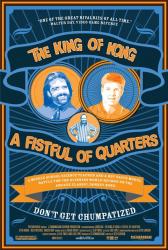 In a certain sense, it's no surprise that The King of Kong: A Fistful of Quarters, isn't getting much commercial play. It's not that The King of Kong isn't compelling; on the contrary, I'm prepared to argue that it's the most impressively told story this year, in any medium. But we Americans prefer our movies as fable, not fact. That's a shame, because The King of Kong is celluloid perfection, and a spot-on realization of the American mythos to boot.
In a certain sense, it's no surprise that The King of Kong: A Fistful of Quarters, isn't getting much commercial play. It's not that The King of Kong isn't compelling; on the contrary, I'm prepared to argue that it's the most impressively told story this year, in any medium. But we Americans prefer our movies as fable, not fact. That's a shame, because The King of Kong is celluloid perfection, and a spot-on realization of the American mythos to boot.
The protagonist -- nay, the hero -- of The King of Kong is Steve Wiebe, a soft-spoken, hangdog family man who was left reeling after being fired from his job at Lockheed. To deal with this latest setback in a life even Charlie Brown would pity, Wiebe turned to Donkey Kong, universally acknowledged as the toughest classic arcade game ever created, and decided to be, just once, a winner.
What Wiebe can't possibly know is that his dreams wil put thrust him into a weird, insular world, putting him squarely at odds with the reigning King of Kong, Billy Mitchell. Per The Filthy Critic:
Mitchell wears cheap, patriotic ties that you might see on the clearance rack at Wal-Mart, has a mullet he blow-dries and fusses over, and a weasely face. He runs a chicken-wing shack, sells hot wing sauce and thinks he's pretty big shit. He looks like he's had at least one bitchin' Camaro in his past. He talks easily about how great and clever he thinks he is, even though his accomplishments don't extend beyond old video games. He doesn't do anything that won't directly reflect glory on himself. He also holds multiple records at video games, including Donkey Kong.Worse still are the assholes in the record-keeping establishment that make sure Mitchell stays the champ. These men (and I use that term loosely) are the most richly drawn supporting cast in American cinema this year. Walter Day is the captain on this ship of fools. He's the head of the video game record keeping organization (imagine a nerdier Guinness) who dresses up in a tight-fitting referee jersey to judge officially sanctioned events. Brian Kuh, meanwhile, has devoted much of his life to defeating Mitchell's record, and would rather sabotage Wiebe than see someone other than him top it.
 With the collaboration of others, they break into Wiebe's home to poke around in Wiebe's Donkey Kong, looking for a way to discredit him. They refuse to let him submit a videotaped record, even though Mitchell did. They make sure that Mitchell's record is met with fanfare (admittedly of the internet variety, but hey, publicity is publicity) and consistently try to downplay Wiebe's accomplishments.
With the collaboration of others, they break into Wiebe's home to poke around in Wiebe's Donkey Kong, looking for a way to discredit him. They refuse to let him submit a videotaped record, even though Mitchell did. They make sure that Mitchell's record is met with fanfare (admittedly of the internet variety, but hey, publicity is publicity) and consistently try to downplay Wiebe's accomplishments.Pitted against such an obviously corrupt establishment, Wiebe becomes the closest thing we have to a folk hero in the digital age. He is America's David, armed not with a sling but a joystick; he is Rocky Balboa in bermuda shorts. Ultimately, Wiebe's struggle is not just his own but our own, as only the earnest quest for purpose in a hostile world can be. We cringe at his failures and we exalt in his success. It's beyond Americana: it's the quintessential human tale, sung by Homeric bards and medieval troubadours, now set to the silver screen.



No comments:
Post a Comment